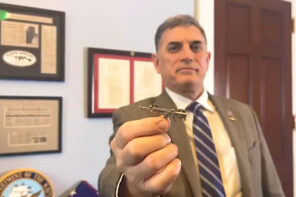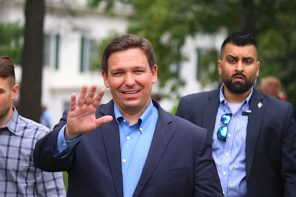“Some are trying to separate the social, cultural issues from fiscal issues, but you really can’t do that. America works, freedom works, when people have that internal gyroscope that comes from a belief in God and biblical faith. Once we push that out, you no longer have the capacity to live as a free person without the external controls of an authoritarian government. I’ve said it often and I believe it—the bigger government gets, the smaller God gets. As people become more dependent on government, less dependent on God.”
Thus spake Jim DeMint, the ultra-conservative Republican senator from South Carolina, in a recent radio interview with Tony Perkins of the Family Research Council. No, I don’t listen to Tony Perkins. I found the quote thanks to Think Progress blogger Scott Keyes, who offered what he calls this “outlandish statement” as an example of conservatives’ tendency “to dress their political ideology in religious language.”
Maybe so. Politicians typically say what their audiences want to hear and this kind of God-talk would certainly please Tony Perkins’ audience. And it certainly strikes most progressives’ ears as outlandish.
But let’s not rush to assume that DeMint’s words are outlandish (“freakishly or grotesquely strange or odd” is my dictionary’s definition), nor that they’re just a sneaky way to trick pious folks into swallowing a nefarious political ideology.
I don’t know Jim DeMint and I haven’t followed his career closely, so I’ve got no way to assess the sincerity or hypocrisy of his religious language. But I do know that his words can make perfect logical, and theological, sense to many millions of Americans. I know that those millions see God and government inextricably tied together in what strikes them as a perfectly reasonable way. And not all of them are far-right Tea Party fanatics—not by any means.
In fact, I first came to understand the logic behind DeMint’s argument by studying Dwight D. Eisenhower, who was widely seen in his day—and even more so now—as an archetypal middle American, straight from the Kansas heartland. Since Ike held on to the conservative Kansan political views he was raised with, it’s more accurate to call him a middle-of-the-road, not at all outlandish, conservative.
Although Eisenhower was certainly no profound intellectual, neither was he the simpleton that egghead liberals made him out to be. He articulated his political views in clear, consistent terms, and those views were rooted in religious premises shared both then and now by a sizeable chunk of the American public.
Ike’s worldview was based on a stark division of all humanity into two categories. It wasn’t communism versus the free world; that came further down in his chain of logic. More fundamentally, he divided the world into two kinds of people, the selfish and the self-restrained: those who let themselves indulge every self-serving whim of the moment and those who were both willing and able to control themselves for some longer-term good. He saw both kinds everywhere, even in his beloved US Army.
Eisenhower showed no interest in formal theology, but he must have known that his moral dualism reflected the theology of his parents and ancestors, all members of Anabaptist churches. In his plainspoken way, he was talking about the stark difference between the sinners and the saved.
While he probably wasn’t familiar the writings of his contemporary, Reinhold Niebuhr, the two arrived by very different routes at the same deep concern about selfishness, which both saw as the great threat to human life; unchecked, it would lead to a Hobbesian war of all against all that would tear society apart. So Eisenhower’s fear of selfishness was a secularized version of what both his Anabaptist ancestors and Niebuhr called by its Christian name: original sin.
Likewise, he shared their Christian view that rampant sin, with all its destructive effects, had to be held in check at all costs—one way or another. For Ike, one way was self-restraint, freely chosen by the masses; the other was social order, forcefully imposed by the authorities.
In allowing for both alternatives, Ike showed himself to be neither Niebuhrian nor Anabaptist. He believed that the whole “city of man” and all its inhabitants could achieve self-restraint by proper exercise of their free will. This was the great role of religion, he said—every religion taught the same essential message: the human capacity and vital need to choose self-restraint.
It was equally the role of political leaders to encourage and point the way to virtuous free choice; and, to make sure that the people always had free choice, to see that they were never coerced into virtuous behavior by authoritarian political measures. That commitment was the root of Ike’s Cold War fervor. Communism’s attack on free enterprise economics was only one manifestation, as he saw it, of the truly great evil: the subordination of every kind of personal freedom to the arbitrary will of the government.
“Freedom has been defined as the opportunity for self-discipline,” he said in his 1957 State of the Union address. “Should we persistently fail to discipline ourselves, eventually there will be increasing pressure on government to redress the failure. By that process freedom will step by step disappear.”
Since, in this view, religion and politics are merely two different routes to the same moral goal, it becomes illogical to separate the two. So Eisenhower could say, famously, that “Our form of government has no sense unless it is founded in a deeply felt religious faith, and I don’t care what it is.”
This often-ridiculed assertion made perfect sense within his worldview. “Deeply felt religious faith” of any kind was, in essence, a commitment to practicing voluntary self-discipline. And “our form of government” was devoted, above all, to preserving the freedom that allowed all choices to be voluntary. Jim DeMint would surely agree. So would many millions of Americans.
If we take “God” as a verbal symbol for the whole realm of religious faith—as the vast majority of conservatives do, I suspect—then Eisenhower would surely have agreed with DeMint: “America works, freedom works, when people have that internal gyroscope that comes from a belief in God.” The “internal gyroscope” is nothing but the willed commitment to maintain self-discipline in the face of every temptation to selfishness. Without it, Ike would have agreed, “you no longer have the capacity to live as a free person”; you’ll have to submit to “the external controls of an authoritarian government.”
What Ike would have rejected is DeMint’s assumption that “biblical faith” is necessary for voluntary virtue. That’s an important difference, to be sure. But for understanding political conservatism, the difference between those who demand “biblical faith” and those who make it optional is not as important as the shared premise of original sin.
Within this worldview it’s perfectly logical to claim, as DeMint did, that you cannot “separate the social, cultural issues from fiscal issues”; the “social, cultural issues” are all about restraining desires for sense pleasure, which conservatives assume must be selfish desires, while the fiscal issues are all about the hand of government in our lives. Once that hand becomes too heavy, we lose the opportunity to restrain desires of all kinds freely and voluntarily.
That’s the logic behind DeMint’s conclusion: “The bigger government gets, the smaller God gets. As people become more dependent on government, less dependent on God.” In other words, as people become more dependent on government to control the anarchic forces spawned by original sin, the less freedom they have to develop the spiritual resources that are the only route to self-control.
It’s an old idea, but it gained a new sense of urgency for conservatives in the 1960s, when they saw a radical idea threatening to break into the cultural mainstream: that natural human impulses and desires, including desires for sense pleasure, are inherently trustworthy and need not threaten the orderly structures of society.
Since that turbulent decade, conservatives have been mounting a desperate counterattack against the trust in desire, using an endless series of political issues to wage their fight: communism, multiculturalism, drugs, abortion, school prayer, terrorism, gay marriage (the list goes on and on)—and “big government.” Each symbolizes, in its own way, the threat of original sin unleashed and the anarchy it would supposedly breed.
From this perspective it’s not at all outlandish to see theological meaning in the conservative drive for slashing government spending for human services. It’s perfectly reasonable if we accept some version (no matter how secularized) of the concept of original sin. That concept makes it just as reasonable to spend endlessly on “national security,” to protect us from the evil machinations of sinners abroad. Here at home though, everyone must be left free to make their own choices and face the consequences.
This is only one theological argument for cutting domestic government spending. There are surely others, but all lead back to the premise of original sin.
Whether we, the people of the United States, should accept that ancient doctrine as a foundation of our collective political life is the great question of our time. Unfortunately, it remains virtually undebated in public political discourse because its central role remains largely invisible. If Jim DeMint and all conservative politicians were forced to come out of the theological closet and talk about original sin directly, then we might see what a truly fruitful political debate looks like.




